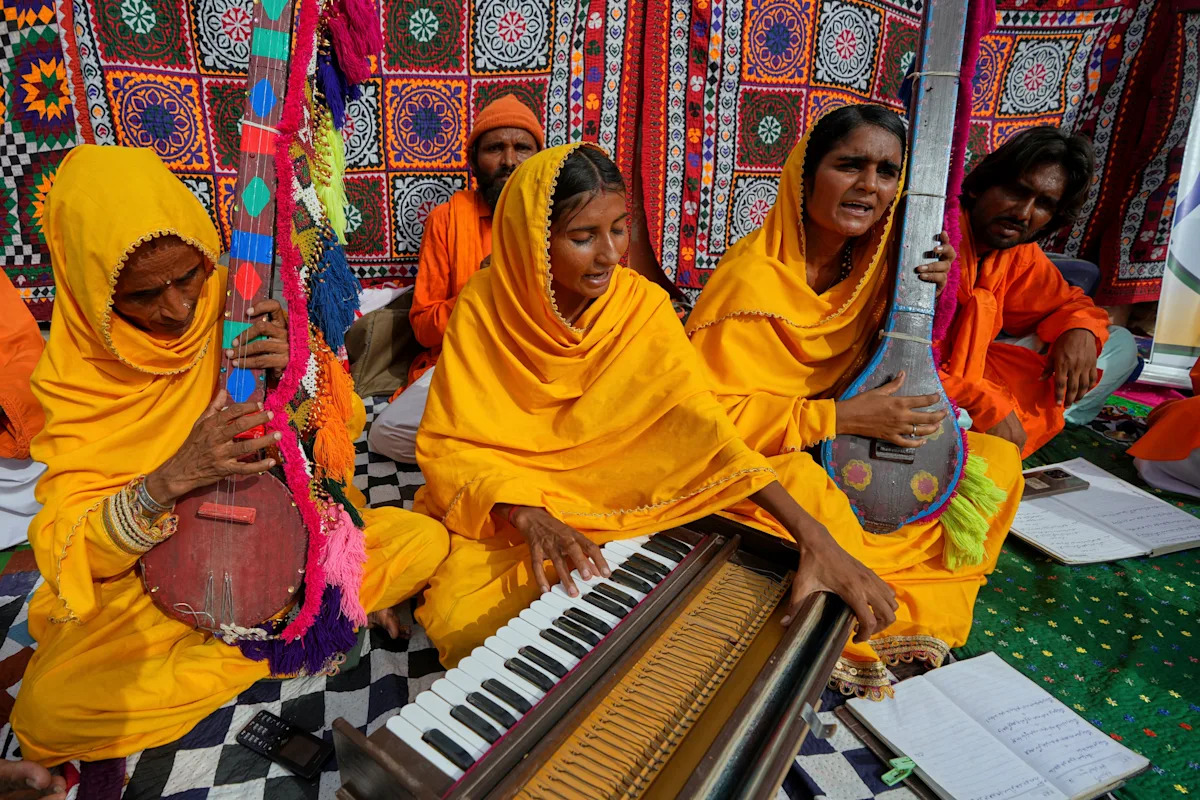In the heart of Sindh, Pakistan, musicians are using the power of folk songs and rap to raise awareness about climate change. In Umerkot district, villagers gather to listen as Sham Bhai, a local folk musician, sings poignant lyrics that reflect their struggles with shifting weather patterns and devastating floods. Her message resonates deeply in a region that has faced severe climate impacts, including more than 1,000 rain-related deaths in just a few months in 2022.
Sham has been performing in various villages across Sindh for the past two years, educating communities about climate adaptation through her music. “When we give a message through song, it is easy to communicate to people because they understand it,” the 18-year-old artist shared with The Associated Press. She sings in Sindhi, the local language, which is more familiar to her audience than the national language, Urdu.
The devastation in Sindh is visible, with broken roads and flattened homes that residents have yet to rebuild. Floods have submerged entire districts like Tando Allahyar, leaving communities vulnerable. Sham’s lyrics highlight the fragility of homes built from mud, emphasizing that women and children often bear the brunt of extreme weather events, particularly when men are away for work. “The meaning of the song is that poor people’s homes built on mud are not strong,” she explained.
Rural communities in Sindh are grappling with significant challenges, including poverty and a literacy rate that plummets to 38% in these areas. Farmers are adapting their practices, shifting from summer crops to more reliable winter varieties as they contend with unpredictable monsoon seasons. “The monsoon season used to come on time, but now it starts late,” said local farmer Ghulam Mustafa Mahar. His comments reflect a broader trend in the region, where climate change is altering traditional agricultural patterns.
As Sham and her fellow musicians engage local audiences with popular tunes before transitioning to more somber themes about climate impacts, they are witnessing tangible changes in community behavior. “People are acting on our advice; they are planting trees and making their houses strong to face climate change,” she noted.
In addition to folk music, rap is also emerging as a powerful tool for climate advocacy in Sindh. Activist Urooj Fatima, known by her stage name Sindhi Chhokri, is harnessing this genre to reach wider audiences. After her village experienced devastating floods in 2022 and 2024, she recognized the urgency of raising awareness. “We can engage a lot of audiences through rap,” she explained. “Through rap, we can reach out to hundreds of thousands of people through our voice and our message.”
Urooj’s lyrics are not only a call for awareness but also a critique of governmental inaction. She raps about the dire conditions in regions like Balochistan, Pakistan’s most impoverished province, where infrastructure is crumbling and recovery efforts lag behind. “There are potholes on the road; the roads are ruined,” she states in her verses, demanding accountability from officials who failed to respond effectively during the floods.
Despite facing criticism for her outspoken views, Urooj remains undeterred. She and her sister, Khanzadi, actively campaign for climate justice, visiting villages and planting trees to promote sustainability. Urooj emphasizes the disproportionate impact of climate change on women and girls, who often lack access to resources and education. “For women, there are no opportunities or facilities. And then, if a flood comes from above, they face more difficulties,” she said.
The innovative approaches of Sham and Urooj highlight the vital role of music in advocating for climate awareness in Pakistan. Their efforts not only entertain but also educate, empowering communities to take action against the looming threat of climate change. As they continue to perform, these musicians are not just sharing their art; they are igniting a movement for change in a region that desperately needs it.
